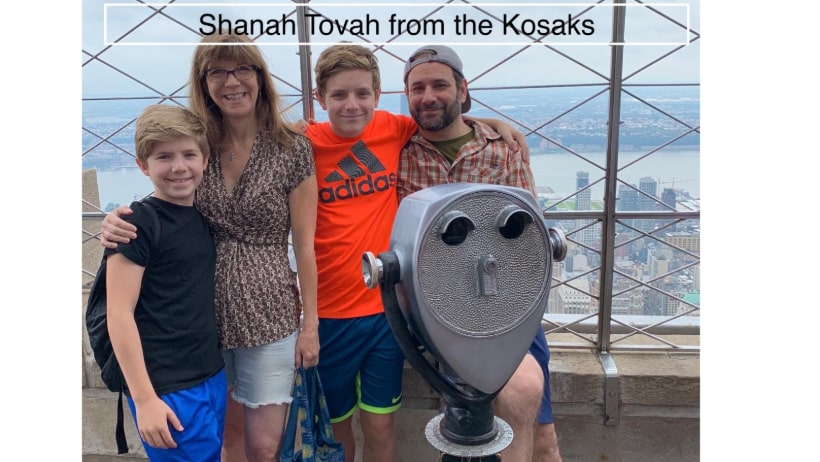Oasis Songs: Musings from Rav D
Friday, September 18, 2020 / 29 Elul 5780
In the last week or so, congregant Carolyn Weinstein sent me a moving video about a WWII colonel from Tennessee, Roddie Edmonds. Given the era and where he grew up, the army was the first time he had met Jews. As things transpired, many Jews served under his leadership. He and his unit were captured by the Germans, and spent the last days of the war in a POW camp.

Even from the camps, it was clear that the Allies were very close. Their troops and weapons could be heard in the distance. That didn’t stop the Nazi desire to exterminate. In fact, with their time line shrinking, it propelled them to faster action.
So it was that one morning, Mr. Edmonds was told that the Jews were going to be separated out from the other prisoners of war. Everyone knew what that meant. The following morning, the German guard ordered that only the Jews should “fall out’ of their barracks. Edmonds gave the order to all of his troops to fall out, ensuring that the Jews were not alone.
Looking at the mass of men, the German office said, “you can’t all be Jews.” Roddie, the Christian-raised Tennessean spoke up, saying a line that would be repeated in the future. “We are all Jews here.” The German offices scowled, put a Luger to Edmonds head, and said, “You order the Jews out right now, or I’ll shoot you.” Roddie replied to the Nazi officer, “Major, you can shoot me, or all of us, but we know who you are. This war is almost over, and if you shoot me, you will be branded a war criminal.”
With the roar of allied planes on the horizon, the major paused, lowered his pistol, and walked away with his soldiers. That same day, the Germans cleared out from the camp, leaving Edmonds and his unit alone. The silence was haunting. A few days later, on March 30th, American soldiers liberated them.
The Jews who were there never forgot what Edmonds had done, his courage and self-sacrifice for a bunch of Jews at a time when we still weren’t easily accepted in American society. But Roddie never talked about what he had done. The war was past, and he set those memories into the recesses of his mind. He didn’t engage in heroics for recognition. He did so because of his character and his heart.
It was only by happenstance that we came to know his story. Some years after his death, his grown son, a minister, read in a newspaper article a single line about his father’s heroics. There was no context or explanation. But he wanted to get to the bottom of it, and eventually tracked down those still alive who had served under his father. Thus he came to possess a precious legacy of his father’s moral valor.
This is a touching story on its own of a “ger tzedek,” a righteous gentile. As we prepare to enter Rosh Hashanah, this account highlights for me how many malakhim, how many “angels of goodness” walk this earth with us. People who go out of their way to make things better for others.
We can look at the challenges of the past six months as a period of unprecedented pain. That is true. We can also view it as a period marked by so many individuals today, who like yesterday’s Roddie Edmonds, decided to be messengers of kindness. In my sermon tonight, I will speak about love, the sort of hidden love that surrounds us and that the pandemic has revealed, just as this remarkable story was revealed to Colonel Edmond’s son.
Like you, I am also praying that 5781 will bring better times. I am certain it will, just as it is clear that so many of this past year’s health challenges and injustices remain for us to address. There is much we can’t control. Simultaneously, there is much we can. In the face of so much uncertainty, what I would encourage us each to do is to perform more such deeds of chesed, of lovingkindness, that we too will be malakhei hatov, messengers, angels of goodness. This year, why don’t we all commit to performing an extra act of kindness each day. Maybe keep a journal or a tally. When you look back at that list, you might feel a sense of satisfaction or even smile at what a single person can accomplish. Don’t we all need more smiles this new year?
Be a blessing,
Rav D
Shabbat Table Talk
- What were five wonderful moments of the past year for you and yours?
- Do you have commitments for 5781? What would you like to accomplish, who would you like to be?
- Can you recall some moments when you engaged in acts of chesed this past year? What allowed you to do so—what conditions within you and around you? How can you take steps to make sure those conditions exist in the coming year?
If you’d like to continue this discussion, follow this link to CNS’s Facebook page to share your own perspectives on the topics raised in this week’s Oasis Songs. Comments will be moderated as necessary.



